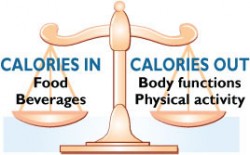So What Are Calories?
When defined in nutrition, calories are a measure of the energy in food. The more calories a particular food has, the more energy it contains. Energy is good, right? In the right amounts, it is. Unfortunately, many of us eat too many calories on a daily basis, and that's what makes us overweight in the first place. Excess calories in the body turn into fat, and that's why you should only eat as much as your body needs.
How Calories Fit Into Weight Loss
[caption id="attachment_26238" align="alignright" width="250"]
 Count your Calories[/caption]
Count your Calories[/caption]
So, what role do calories play in weight loss? It's simple. When you take in or consume fewer calories than your body needs, you lose weight. When you eat too many calories compared to what your body needs, then you gain weight. Your body needs calories to expend as it carries out its basic functions (circulation, excretion, digestion, and so on) as well as to allow you to carry out other activities throughout your day. This is also where exercise fits in; since exercising helps your body burn more calories, it helps you lose weight as well.
In simple words, to lose weight, you need to create a calorie deficit so that your body burns fat to make up for the missing calories. This means you either need to eat less, exercise more, or do a combination of the two (the third option works best).
As a general rule, a calorie deficit of 500 calories a day usually helps you lose one pound of weight in a week. If the calorie deficit is 1000 calories, you lose two pounds. Medical professionals recommend maintaining weight loss in the healthy zone, which is around one to two pounds a week, and not more. However, if you are very obese, you may find yourself losing much more weight in the initial few weeks after you lower your calorie count.
Hopefully this post has helped you understand the link between calories and weight loss better. In a nutshell, maintain a caloric deficit, and you will lose weight. How do you maintain this deficit? It's easy; make healthier low-calorie food choices, cut out unnecessary empty calories from sugary items and alcohol, start being more active throughout the day, and maintain a positive attitude and strong willpower. It won't be easy, but it'll be worth it!
No comments:
Post a Comment